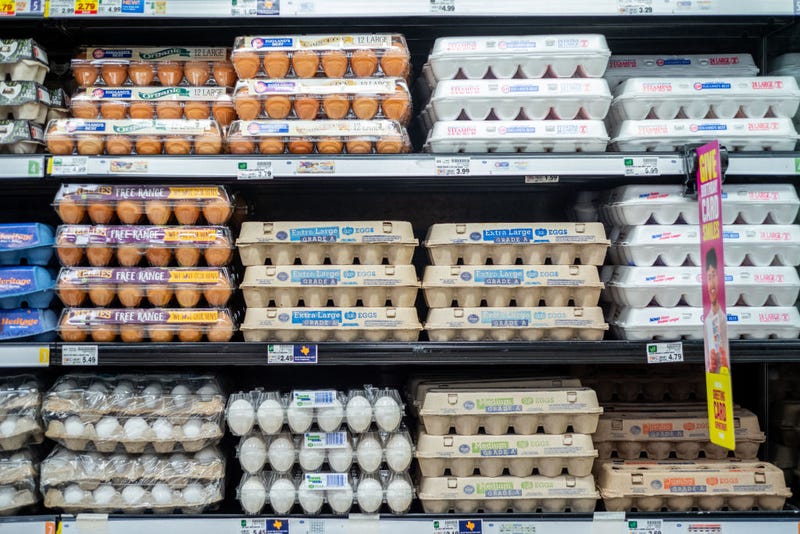
Inflation rose last month to its highest level in four months as the cost of gas, food, and groceries rose, reversing several months of cooling price pressures.
Consumer prices rose 2.7% in June from a year earlier, the Labor Department said Tuesday, up from an annual increase of 2.4% in May. On a monthly basis, prices climbed 0.3% from May to June, after rising just 0.1% the previous month.
"We are seeing the impact of tariffs starting to push up the inflation rate," says CBS News business analyst Jill Schlesinger on the Labor Department's just released report.
The impact is seen the most at the grocery store Schlesinger said.
"We see it most specifically in the food part of this survey. Coffee prices up by 2.2% in just one month, citrus prices up 2.3%," Schlesinger explains.
Worsening inflation poses a political challenge for President Donald Trump, who promised during last year’s presidential campaign to immediately lower costs. The sharp inflation spike of 2022-2023 was the worst in four decades and soured most Americans on former president Joe Biden’s handling of the economy.
Higher inflation will also likely heighten the Federal Reserve’s reluctance to cut its short-term interest rate, as Trump is loudly demanding. These increases would underscore the Federal Reserve's reluctance to cut short-term interest rates.
Excluding the volatile food and energy categories, core inflation increased 2.9% in June from a year earlier, up from 2.8% in May. On a monthly basis, it picked up 0.2% from May to June.
Economists closely watch core prices because they typically provide a better sense of where inflation is headed.
Trump has often insisted in comments on social media that there is “no inflation” and that as a result, the central bank should swiftly reduce its key interest rate from its current level of 4.3% to around 3%.
The uptick in inflation was driven by a range of higher prices. The cost of gas rose 1% just from May to June, while grocery prices increased 0.35. Appliance prices jumped for the third straight month.
"One notable decrease during the month, egg prices down by 7.4%, but those prices are still 27% higher from a year ago," notes Schlesinger. "That is primarily due to the avian flu."
Trump has imposed sweeping duties of 10% on all imports, plus 50% levies on steel and aluminum, 30% on goods from China, and 25% on imported cars. Just last week the president threatened to hit the European Union with a new 30% tariff starting Aug. 1.
The acceleration in inflation could provide a respite of sorts for Federal Reserve Chair Jerome Powell, who has come under increasingly heavy fire from the White House for not cutting the benchmark interest rate.
Powell and other Fed officials have emphasized that they want to see how the economy evolves as the tariffs take effect before cutting their key short-term rate. The Fed chair has said that the duties could both push up prices and slow the economy, a tricky combination for the central bank since higher costs would typically lead the Fed to hike rates while a weaker economy often spurs it to reduce them.
Trump on Monday said that Powell has been “terrible” and “doesn’t know what the hell he’s doing.” The president added that the economy was doing well despite Powell’s refusal to reduce rates, but it would be “nice” if there were rate cuts “because people would be able to buy housing a lot easier.”
Last week, White House officials also attacked Powell for cost overruns on the years-long renovation of two Fed buildings, which are now slated to cost $2.5 billion, roughly one-third more than originally budgeted. While Trump legally can’t fire Powell just because he disagrees with his interest rate decisions, the Supreme Court has signaled, he may be able to do so “for cause,” such as misconduct or mismanagement.
Some companies have said they have or plan to raise prices as a result of the tariffs, including Walmart, the world’s largest retailer. Automaker Mitsubishi said last month that it was lifting prices by an average of 2.1% in response to the duties, and Nike has said it would implement “surgical” price hikes to offset tariff costs.
But many companies have been able to postpone or avoid price increases, after building up their stockpiles of goods this spring to get ahead of the duties. Other companies may have refrained from lifting prices while they wait to see whether the U.S. is able to reach trade deals with other countries that lower the duties.
